牛津译林版英语七年级上Unit 6 Food and lifestyle Reading Ⅱ课件(22张PPT)
文档属性
| 名称 | 牛津译林版英语七年级上Unit 6 Food and lifestyle Reading Ⅱ课件(22张PPT) | 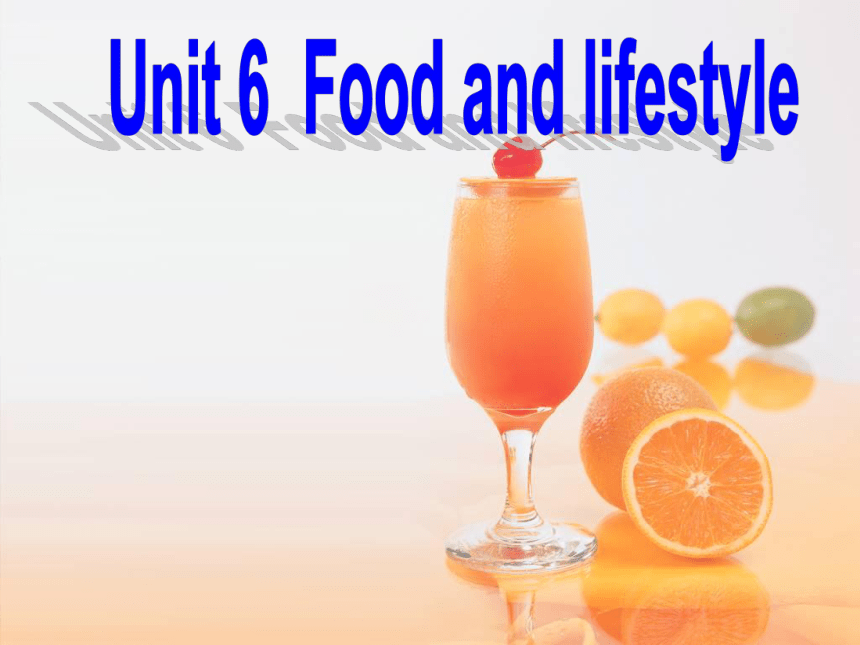 | |
| 格式 | zip | ||
| 文件大小 | 1.1MB | ||
| 资源类型 | 教案 | ||
| 版本资源 | 牛津译林版 | ||
| 科目 | 英语 | ||
| 更新时间 | 2019-07-07 22:25:38 | ||
图片预览


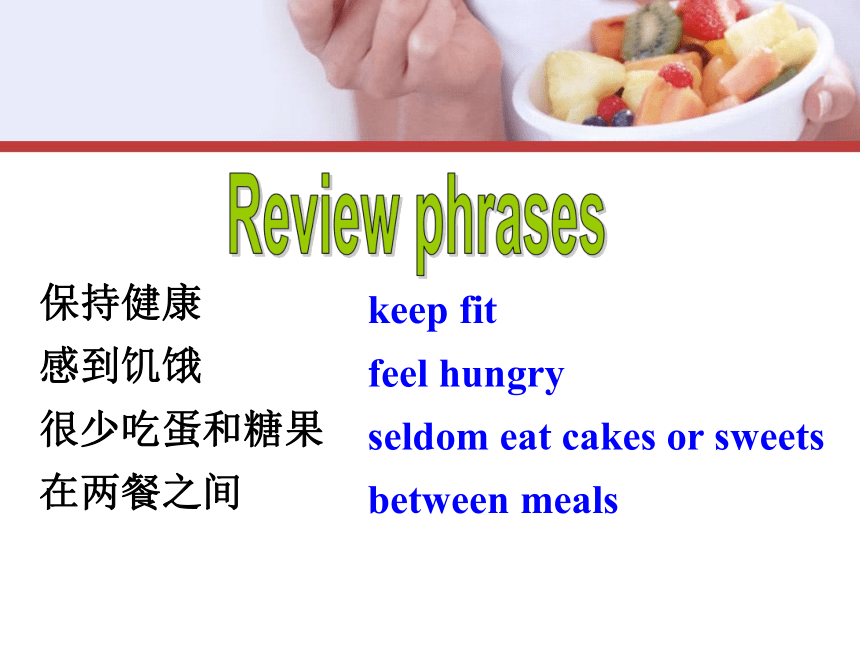
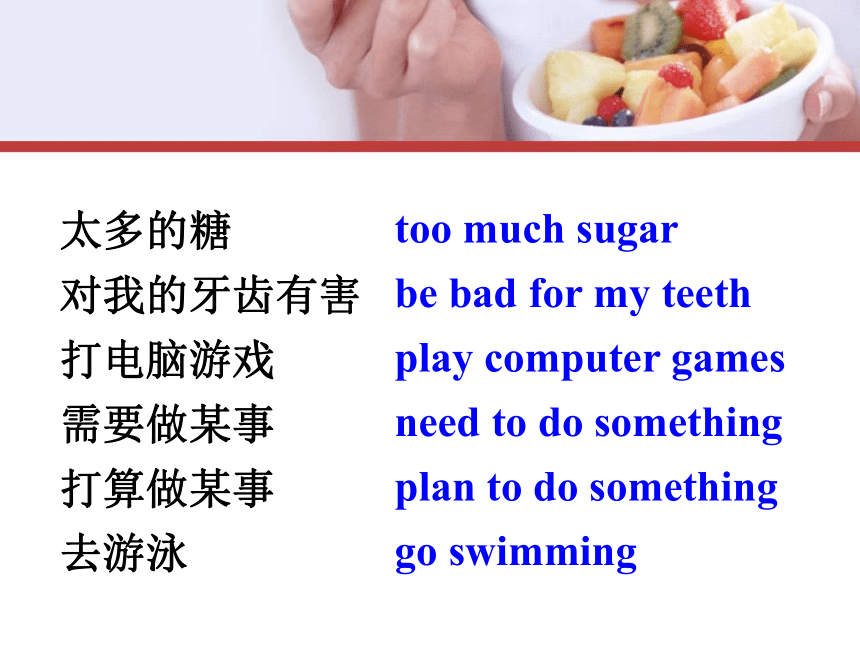
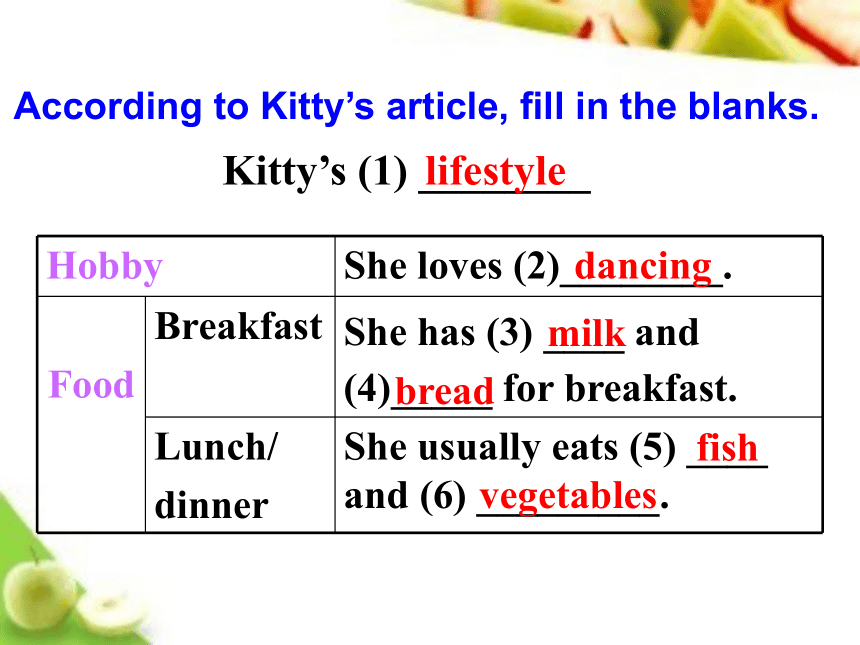
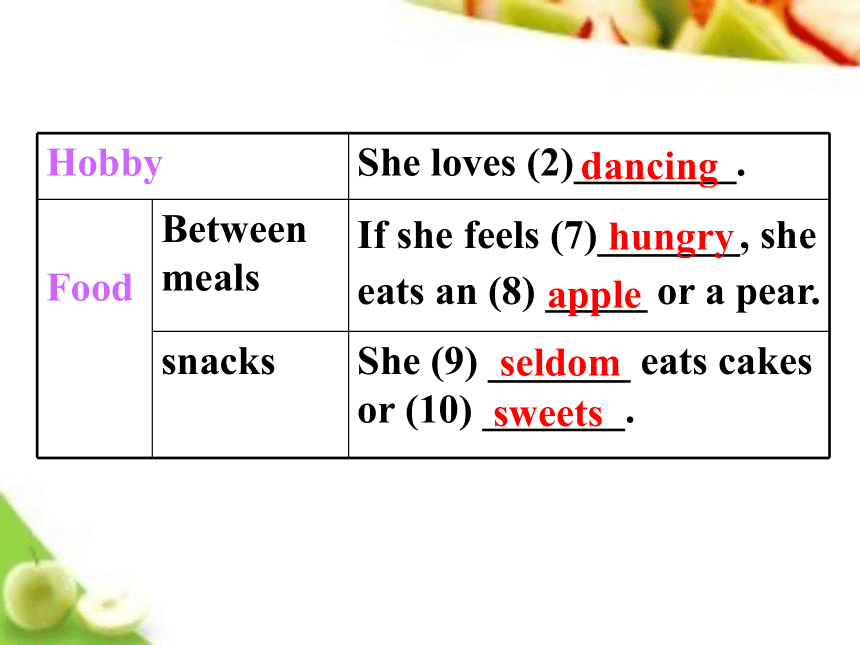
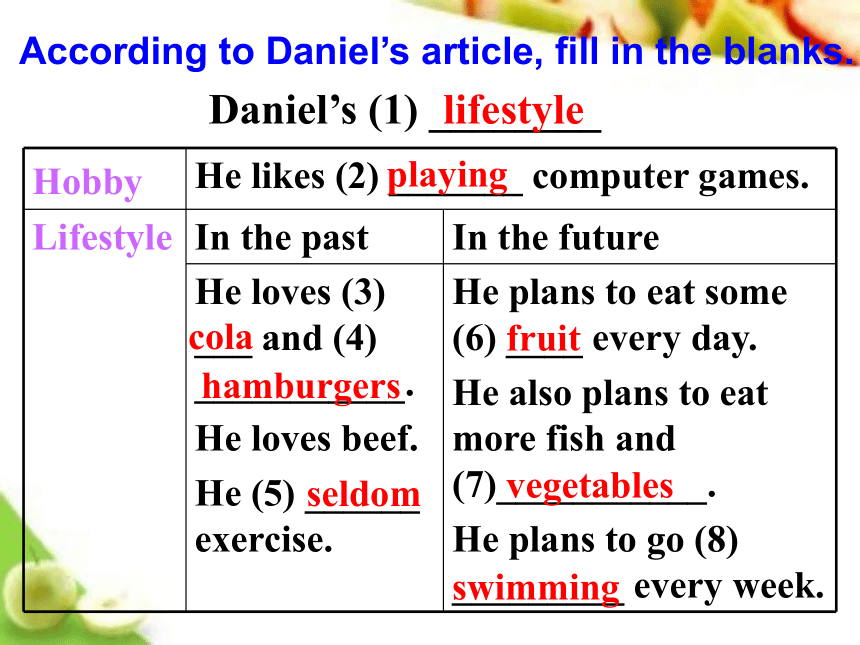
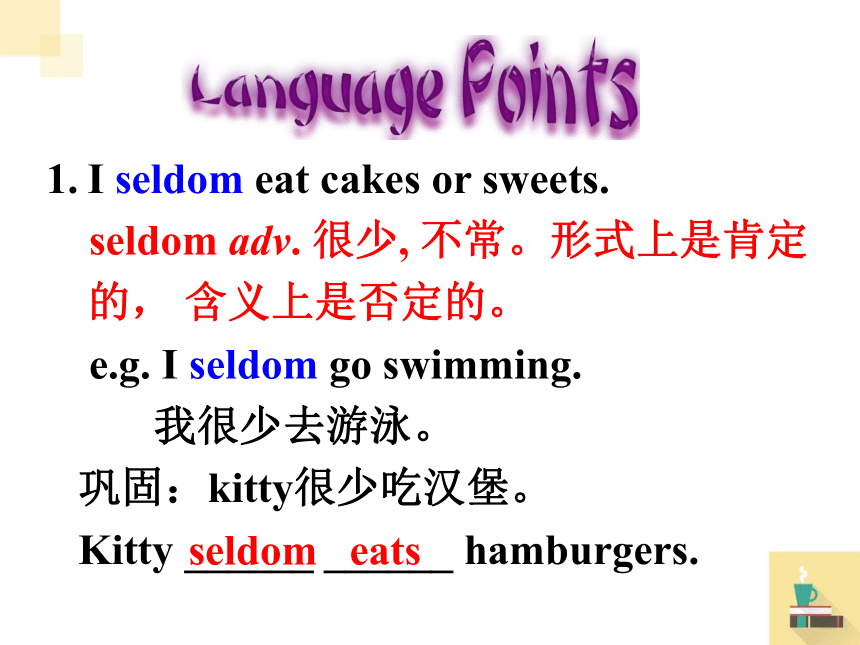

文档简介
(共22张PPT)
保持健康
感到饥饿
很少吃蛋和糖果
在两餐之间
keep fit
feel hungry
seldom eat cakes or sweets
between meals
太多的糖
对我的牙齿有害
打电脑游戏
需要做某事
打算做某事
去游泳
too much sugar
be bad for my teeth
play computer games
need to do something
plan to do something
go swimming
According to Kitty’s article, fill in the blanks.
Kitty’s (1) ________
lifestyle
dancing
milk
bread
fish
vegetables
Hobby She loves (2)________.
Food Breakfast She has (3) ____ and (4)_____ for breakfast.
Lunch/
dinner She usually eats (5) ____ and (6) _________.
sweets
seldom
hungry
apple
dancing
Hobby She loves (2)________.
Food Between meals If she feels (7)_______, she eats an (8) _____ or a pear.
snacks
She (9) _______ eats cakes or (10) _______.
playing
cola
hamburgers
seldom
fruit
vegetables
swimming
According to Daniel’s article, fill in the blanks.
Daniel’s (1) ________
lifestyle
Hobby He likes (2) _______ computer games.
Lifestyle In the past In the future
He loves (3) ___ and (4) ___________.
He loves beef.
He (5) ______ exercise. He plans to eat some (6) ____ every day.
He also plans to eat more fish and (7)___________.
He plans to go (8) _________ every week.
I seldom eat cakes or sweets.
seldom adv. 很少, 不常。形式上是肯定的, 含义上是否定的。
e.g. I seldom go swimming.
我很少去游泳。
巩固:kitty很少吃汉堡。
Kitty ______ ______ hamburgers.
seldom eats
2. I dance for two hours twice every week.
① ②
区分: how long/how often
对表示持续时间的状语提问要用 how long。
e.g. It usually takes me two hours to
finish my homework.
How long does it usually take you to
do your homework?
对在句中作状语用的 always, usually, often, sometimes, every week, once a month, three times an hour 等表示频度的副词或短语提问时, 要用how often。
e.g. He goes swimming once a week.
How often does he go swimming?
巩固:请分别对划线部分①②处提问。
How long do you dance every week?
How often do you dance every week?
3. They have too much sugar and are bad
for my teeth.
区分 too much/much too
too much “太多”用作形容词,后接不可数名词。如:too much water, too much snow, too much rain。也可用作代词。
e.g. Don’t eat too much. 别吃太多了。
much too “太”是副词, 后接形容词或
副词。
e.g. It is much too cold today.
今天太冷了。
be bad for……意为“对……有害(不利)”
e.g. Smoking(吸烟) is bad for our
health. 吸烟有害健康。
4. I plan to go swimming every week.
★plan 可作及物动词,意为“打算,计
划”。
plan to do sth. “计划或打算做某事”
e.g. Can you help me plan my trip to Chengdu? 你能帮我计划一下我的成都之行吗?
When do you plan to take your holiday? 你打算什么时候休假?
★plan 还可作可数名词,意为“计划,
安排”。 表示“有关……的计划”
时,其后可接介词for引起的短语。
e.g. He is making a plan for teaching.
他正在制定一个教学计划。
Do you have any plans for the
summer?
这个夏天你有什么打算?
Match the words on the left with the meanings on the right.
1 healthy ____ a not often
2 fit ____ b do sports
3 hungry ____ c how one lives
4 seldom ____ d good for one’s health
5 exercise ____ e needing food
6 lifestyle ____ f strong and healthy
d
f
e
a
b
c
Talking about your lifestyle with your partner.
I usually have milk and bread for breakfast. I seldom eat cakes ….
For lunch, I always eat fish and vegetables. Sometimes I feel hungry between meals, I eat an apple or a banana….
I like …
I love …
我每周去游泳两次。
I ______________________________.
2. 我早上经常吃牛奶和面包。
I usually eat ____ and _______breakfast.
3. 月饼里面有太多的糖,而且对我的牙齿
也不好。
There is _________sugar in mooncakes
and they are _____ my _______.
go to swimming twice every week
milk bread
too much
bad teeth
4. 丹尼尔需要改变他的生活方式了。
Daniel needs _________ his lifestyle.
5. 我打算每天去踢足球。
I _____________ football every day.
to change
plan to play
1. Read the passage more after class.
2. Recite the words, phrases and
sentences.
保持健康
感到饥饿
很少吃蛋和糖果
在两餐之间
keep fit
feel hungry
seldom eat cakes or sweets
between meals
太多的糖
对我的牙齿有害
打电脑游戏
需要做某事
打算做某事
去游泳
too much sugar
be bad for my teeth
play computer games
need to do something
plan to do something
go swimming
According to Kitty’s article, fill in the blanks.
Kitty’s (1) ________
lifestyle
dancing
milk
bread
fish
vegetables
Hobby She loves (2)________.
Food Breakfast She has (3) ____ and (4)_____ for breakfast.
Lunch/
dinner She usually eats (5) ____ and (6) _________.
sweets
seldom
hungry
apple
dancing
Hobby She loves (2)________.
Food Between meals If she feels (7)_______, she eats an (8) _____ or a pear.
snacks
She (9) _______ eats cakes or (10) _______.
playing
cola
hamburgers
seldom
fruit
vegetables
swimming
According to Daniel’s article, fill in the blanks.
Daniel’s (1) ________
lifestyle
Hobby He likes (2) _______ computer games.
Lifestyle In the past In the future
He loves (3) ___ and (4) ___________.
He loves beef.
He (5) ______ exercise. He plans to eat some (6) ____ every day.
He also plans to eat more fish and (7)___________.
He plans to go (8) _________ every week.
I seldom eat cakes or sweets.
seldom adv. 很少, 不常。形式上是肯定的, 含义上是否定的。
e.g. I seldom go swimming.
我很少去游泳。
巩固:kitty很少吃汉堡。
Kitty ______ ______ hamburgers.
seldom eats
2. I dance for two hours twice every week.
① ②
区分: how long/how often
对表示持续时间的状语提问要用 how long。
e.g. It usually takes me two hours to
finish my homework.
How long does it usually take you to
do your homework?
对在句中作状语用的 always, usually, often, sometimes, every week, once a month, three times an hour 等表示频度的副词或短语提问时, 要用how often。
e.g. He goes swimming once a week.
How often does he go swimming?
巩固:请分别对划线部分①②处提问。
How long do you dance every week?
How often do you dance every week?
3. They have too much sugar and are bad
for my teeth.
区分 too much/much too
too much “太多”用作形容词,后接不可数名词。如:too much water, too much snow, too much rain。也可用作代词。
e.g. Don’t eat too much. 别吃太多了。
much too “太”是副词, 后接形容词或
副词。
e.g. It is much too cold today.
今天太冷了。
be bad for……意为“对……有害(不利)”
e.g. Smoking(吸烟) is bad for our
health. 吸烟有害健康。
4. I plan to go swimming every week.
★plan 可作及物动词,意为“打算,计
划”。
plan to do sth. “计划或打算做某事”
e.g. Can you help me plan my trip to Chengdu? 你能帮我计划一下我的成都之行吗?
When do you plan to take your holiday? 你打算什么时候休假?
★plan 还可作可数名词,意为“计划,
安排”。 表示“有关……的计划”
时,其后可接介词for引起的短语。
e.g. He is making a plan for teaching.
他正在制定一个教学计划。
Do you have any plans for the
summer?
这个夏天你有什么打算?
Match the words on the left with the meanings on the right.
1 healthy ____ a not often
2 fit ____ b do sports
3 hungry ____ c how one lives
4 seldom ____ d good for one’s health
5 exercise ____ e needing food
6 lifestyle ____ f strong and healthy
d
f
e
a
b
c
Talking about your lifestyle with your partner.
I usually have milk and bread for breakfast. I seldom eat cakes ….
For lunch, I always eat fish and vegetables. Sometimes I feel hungry between meals, I eat an apple or a banana….
I like …
I love …
我每周去游泳两次。
I ______________________________.
2. 我早上经常吃牛奶和面包。
I usually eat ____ and _______breakfast.
3. 月饼里面有太多的糖,而且对我的牙齿
也不好。
There is _________sugar in mooncakes
and they are _____ my _______.
go to swimming twice every week
milk bread
too much
bad teeth
4. 丹尼尔需要改变他的生活方式了。
Daniel needs _________ his lifestyle.
5. 我打算每天去踢足球。
I _____________ football every day.
to change
plan to play
1. Read the passage more after class.
2. Recite the words, phrases and
sentences.
同课章节目录
- 预备课程
- Lesson 1 Nice to meet you !
- Lesson 2 A happy family
- Lesson 3 A nice school
- Lesson 4 You look cool !
- Lesson 5 Wonderful things
- Lesson 6 Have nice food
- Lesson 7 Enjoy our days
- Lesson 8 Let's have fun !
- Unit 1 This is me
- Unit 2 Let's play sports
- Unit 3 Welcome to our school
- Unit 4 My day
- Unit 5 Let’s celebrate
- Unit 6 Food and lifestyle
- Unit 7 Shopping
- Unit 8 Fashion
